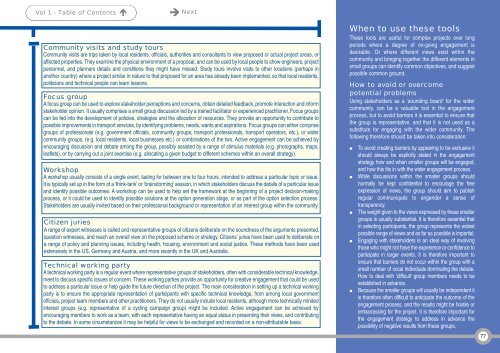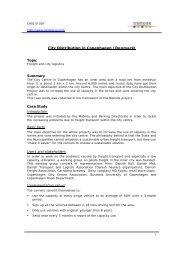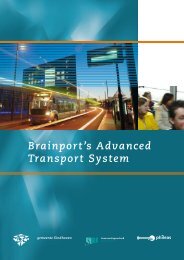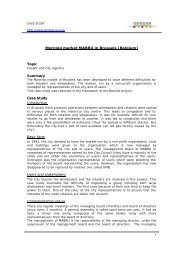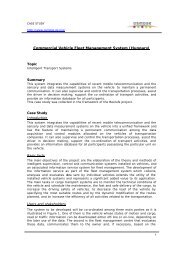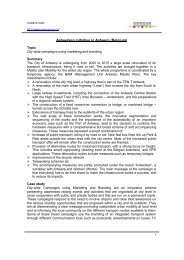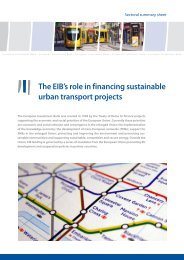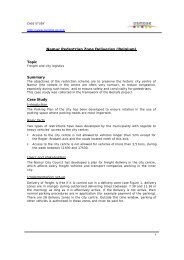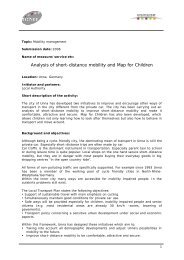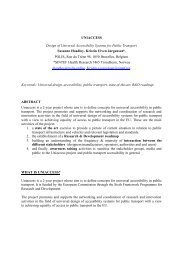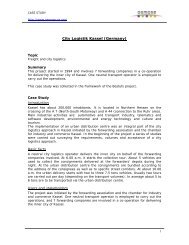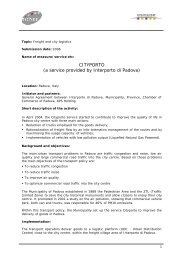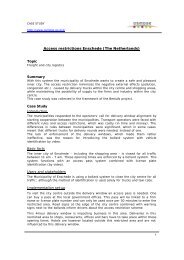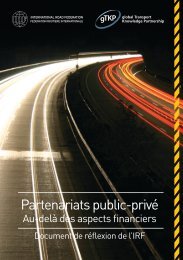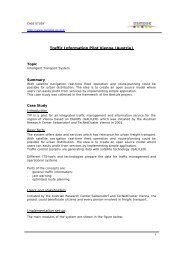Successful transport decision-making - Osmose
Successful transport decision-making - Osmose
Successful transport decision-making - Osmose
You also want an ePaper? Increase the reach of your titles
YUMPU automatically turns print PDFs into web optimized ePapers that Google loves.
Vol 1 - Table of Contents <br />
Next<br />
Community visits and study tours<br />
Community visits are trips taken by local residents, officials, authorities and consultants to view proposed or actual project areas, or<br />
affected properties. They examine the physical environment of a proposal, and can be used by local people to show engineers, project<br />
personnel, and planners details and conditions they might have missed. Study tours involve visits to other locations (perhaps in<br />
another country) where a project similar in nature to that proposed for an area has already been implemented, so that local residents,<br />
politicians and technical people can learn lessons.<br />
Focus group<br />
A focus group can be used to explore stakeholder perceptions and concerns, obtain detailed feedback, promote interaction and inform<br />
stakeholder opinion. It usually comprises a small group discussion led by a trained facilitator or experienced practitioner. Focus groups<br />
can be fed into the development of policies, strategies and the allocation of resources. They provide an opportunity to contribute to<br />
possible improvements in <strong>transport</strong> services, by identifying problems, needs, wants and aspirations. Focus groups can either comprise<br />
groups of professionals (e.g. government officials, community groups, <strong>transport</strong> professionals, <strong>transport</strong> operators, etc.), or wider<br />
community groups, (e.g. local residents, local businesses etc.) or combinations of the two. Active engagement can be achieved by<br />
encouraging discussion and debate among the group, possibly assisted by a range of stimulus materials (e.g. photographs, maps,<br />
leaflets), or by carrying out a joint exercise (e.g. allocating a given budget to different schemes within an overall strategy).<br />
Workshop<br />
A workshop usually consists of a single event, lasting for between one to four hours, intended to address a particular topic or issue.<br />
It is typically set up in the form of a 'think-tank' or 'brainstorming' session, in which stakeholders discuss the details of a particular issue<br />
and identify possible outcomes. A workshop can be used to help set the framework at the beginning of a project <strong>decision</strong>-<strong>making</strong><br />
process, or it could be used to identify possible solutions at the option generation stage, or as part of the option selection process.<br />
Stakeholders are usually invited based on their professional background or representation of an interest group within the community.<br />
Citizen juries<br />
A range of expert witnesses is called and representative groups of citizens deliberate on the soundness of the arguments presented,<br />
question witnesses, and reach an overall view on the proposed scheme or strategy. Citizens' juries have been used to deliberate on<br />
a range of policy and planning issues, including health, housing, environment and social justice. These methods have been used<br />
extensively in the US, Germany and Austria, and more recently in the UK and Australia.<br />
Technical working party<br />
A technical working party is a regular event where representative groups of stakeholders, often with considerable technical knowledge,<br />
meet to discuss specific issues of concern. These working parties provide an opportunity for creative engagement that could be used<br />
to address a particular issue or help guide the future direction of the project. The main consideration in setting up a technical working<br />
party is to ensure the appropriate representation of participants with specific technical knowledge, from among local government<br />
officials, project team members and other practitioners. They do not usually include local residents, although more technically minded<br />
interest groups (e.g. representative of a cycling campaign group) might be included. Active engagement can be achieved by<br />
encouraging members to work as a team, with each representative having an equal status in presenting their views, and contributing<br />
to the debate. In some circumstances it may be helpful for views to be exchanged and recorded on a non-attributable basis.<br />
When to use these tools<br />
These tools are useful for complex projects over long<br />
periods where a degree of on-going engagement is<br />
desirable. Or where different views exist within the<br />
community and bringing together the different elements in<br />
small groups can identify common objectives, and suggest<br />
possible common ground.<br />
How to avoid or overcome<br />
potential problems<br />
Using stakeholders as a 'sounding board' for the wider<br />
community, can be a valuable tool in the engagement<br />
process, but to avoid barriers it is essential to ensure that<br />
the group is representative, and that it is not used as a<br />
substitute for engaging with the wider community. The<br />
following therefore should be taken into consideration:<br />
<br />
<br />
<br />
<br />
<br />
To avoid creating barriers by appearing to be exclusive it<br />
should always be explicitly stated in the engagement<br />
strategy how and when smaller groups will be engaged,<br />
and how this fits in with the wider engagement process.<br />
While discussions within the smaller groups should<br />
normally be kept confidential to encourage the free<br />
expression of views, the group should aim to publish<br />
regular communiqués to engender a sense of<br />
transparency.<br />
The weight given to the views expressed by these smaller<br />
groups is usually substantial. It is therefore essential that<br />
in selecting participants, the group represents the widest<br />
possible range of views and as far as possible is impartial.<br />
Engaging with stakeholders is an ideal way of involving<br />
those who might not have the experience or confidence to<br />
participate in larger events. It is therefore important to<br />
ensure that barriers do not occur within the group with a<br />
small number of vocal individuals dominating the debate.<br />
How to deal with 'difficult' group members needs to be<br />
established in advance.<br />
Because the smaller groups will usually be independent it<br />
is therefore often difficult to anticipate the outcome of the<br />
engagement process, and the results might be hostile or<br />
embarrassing for the project. It is therefore important for<br />
the engagement strategy to address in advance the<br />
possibility of negative results from these groups.<br />
77


